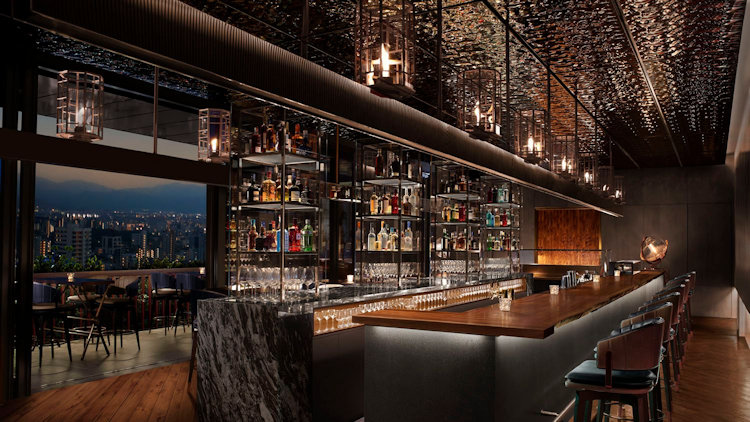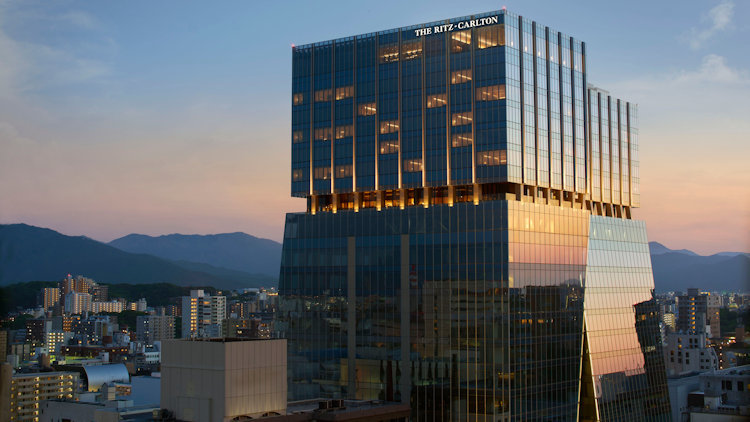The Ritz-Carlton, Fukuoka Weaves Together Tradition and Modernity in Japan
ARTICLE COURTESY OF.. https://www.luxurytravelmagazine.com/
The Ritz-Carlton, part of Marriott Bonvoy’s portfolio of 31 exceptional hotel brands, announced the opening of The Ritz-Carlton, Fukuoka on the island of Kyushu in Southern Japan. Rising above Fukuoka, the luxury hotel is situated within the 364 foot 111-meter main tower of Fukuoka Daimyo Garden City, the tallest urban lifestyle complex in the city’s core commercial district. The Ritz-Carlton, Fukuoka brings the brand’s unparalleled service and contemporary aesthetic to one of Japan’s fastest growing cities famous for its thriving start-up scene as well as for its enduring history, traditions, and outstanding culinary culture.

Fukuoka was once a key waypoint of Silk Road trade routes, and today the city remains a major gateway between Japan and the rest of Asia. The destination is famous for its annual festivals, such as the 800-year old Hakata Gion Yamakasa summer festival, designated by UNESCO as Intangible Cultural Heritage. Other attractions include its beautiful beaches, natural parks, and historic places such as the 12th-century Shofukuji temple and the Fukuoka Castle ruins. The Ritz-Carlton, Fukuoka is adjacent to Tenjin, the trendy heart of the city, a rising tech hub filled with shops, bars, cafés, and nightlife. The area is 15 minutes by car or public transportation to Hakata Station, Hakata Port or Fukuoka Airport, which links the city to Tokyo.

The Ritz-Carlton, Fukuoka occupies the nine topmost floors in a 25-story glass tower designed by Kume Sekkei of Tokyo. Overseen by Melbourne-based Layan Architects + Designers, the hotel’s interior design and art take inspiration from Fukuoka’s traditional yarn-dyed silk and kimono weaving craft, called “Hakata-ori”. Throughout the spaces, folding screens, sculptures, paintings, and woven textiles by local artisans are intermingled into the overall design narrative. From the hotel, expansive views overlooking the Genkai Sea and surrounding hills form a backdrop that create an exceptional sense of place.

On the 19th to 23rd floors, the hotel features 167 generously sized guestrooms of 50 square meters, including 20 suites that start at nearly 550 square feet. Fukuoka Skyline rooms offer sweeping views of the city, while Park View rooms overlook the greenery of Ohori Park. From Bay View rooms, guests can see the passing ships of Hakata Bay and beyond. The nearly 1,500 square-foot Presidential Suite and the more than 2,000 square-foot Ritz-Carlton Suite each feature a dining room and kitchen for private meals. On the 24th and topmost floor of the hotel, The Ritz-Carlton Club is a private sanctuary for guests staying in club and suite categories. Five culinary presentations are offered daily including breakfast, lunch, afternoon tea, hors d’oeuvres, and cordials. With its bar and a private room, The Ritz-Carlton Club offers a convenient venue for business and social gatherings. Live jazz performances are held every Saturday night, and a dedicated concierge service ensures personalized care for guests, from pre-arrival to departure.
The hotel’s four restaurants and two bars reflect the vibrant food culture of Fukuoka. Sustainably produced local ingredients are transformed into creative farm-to-sky Western cuisine at Viridis, and three of Japan’s finest culinary traditions—kaiseki, sushi, and teppanyaki— are showcased at the stylish Genjyu. The Lobby Lounge & Bar offers a welcoming space to pause for refreshments and light meals throughout the day, and Bay, inspired by the passing ships of Hakata Bay, offers original cocktails along with chargrilled dishes and tapas to enjoy on its terrace with breathtaking views. Diva is a refined yet relaxed café serving light meals, decadent desserts and afternoon tea showcasing the celebrated green teas of Kyushu.

The Ritz-Carlton Spa, located on the 24th floor, features an indoor swimming pool overlooking the bay, a gymnasium with exceptional city views, and both single and double private rooms for indulgent treatments using local ingredients and featuring products from ESPA. The hotel also offers child-friendly amenities and activities from the brand’s signature Ritz Kids program, including guided excursions and craft experiences designed around the program’s four pillars of nature, exploration, responsibility, and culture to bring the destination alive for young travelers.
Two versatile banquet venues on the third floor of the hotel, the 1,100 square-foot Ritz-Carlton Studio and 3,600 square-foot Ritz-Carlton Ballroom, can be flexibly configured to accommodate breakout sessions, board meetings, and other gatherings. The Ballroom is equipped with a LED screen enabling spectacular film and video presentations. The hotel’s Chapel, located on the third floor, unites Western and Japanese influences for wedding ceremonies.
For more information, visit https://www.ritzcarlton.com/fukuoka and enjoy a video here.
WiFi in Hotels: Should You Provide Guests With Free Internet Access?

Does your hotel offer free wifi to its guests?
If not, you may want to reconsider. Free internet access may be the key to getting good reviews and having return customers. In contrast, not having free wifi may be costing you customers and destroying your reputation.
But what is the importance of wifi in hotels? If you offer a paid version or a temporary wifi option, isn’t that enough?
You’d be surprised. Keep reading to learn about why we think that free wifi is the best option for your hotel and your guests alike.
It’s Essential For Business Travelers and Remote Workers
For many hotels, business travelers are the most frequent kinds of guests. People who travel for business love the ease of hotel stays and they often have company compensated lodging.
Your business travelers need to have reliable internet. Sure, they may be willing to pay for it, but when other options offer it for free, who are they going to choose?
This is also true of anyone who works remotely. These workers may be on a leisure trip but they’ll still want to get work done while they’re enjoying themselves. If your hotel doesn’t cater to them you won’t get their business.
You’ll Have Better Online Reviews
When customers see “free hotel wifi” they’re going to be interested. Some people search specifically for “is there wifi in hotels?” to get the hotel that they’re looking for.
Hotels without free wifi may experience upset reviews that will mention this problem. Bad reviews are bad for business. It’s not worth it.
You’ll Get More Return and Word of Mouth Guests
Word of good hotel service travels fast, and people are happy to share their experiences with friends and family.
When a guest knows that you cater to all of their internet needs they’ll be more inclined to come back next time they take a trip. Plenty of travelers return to the same locations every year and they’d love to have reliable lodging so they don’t have to plan and vet hotels over and over again.
If you want your guests to come back to you, you should look into hospitality wifi solutions as soon as possible.
It’s No Longer a Luxury
Let’s face it: wireless internet is no longer a luxury. It’s as essential as electricity and people need it to go about their daily lives.
Whether they’re working or updating their blogs and social media pages, people expect wifi to be available. It’s available in coffee shops, restaurants, and many other places that customers frequent. Why wouldn’t you offer it to your valued guests?
It’s time to get with the times. You wouldn’t have a room without other utilities, right?
Wifi In Hotels Is Necessary
Wifi in hotels is no longer considered a bonus or special treat. When all of the hotels around you are offering free wifi you’re going to stick out as the “bad option”. You’ll lose guests to your competition.
If you want to do better it’s as easy as finding good wifi solutions for your hotel. Don’t let your hotel fall behind the times.
For more articles that can help you get and keep customers, keep tabs on our blog.
Colombia strengthens regional economies and promotes cooperation instead of competition
https://kontrast.at/kolumbien-wirtschaft-petro/
Latin America is emerging as the place to look for alternatives to the neoliberal economic system. In Colombia, the Gustavo Petro led government has spent the last year restructuring the previously isolated sector of small businesses and cooperatives. Petro wants to shift away from this model, and into a solidarity-based system.
The German-language Latin America news portal amerika21 reports that the establishment of a solidarity sector is intended to promote small domestic companies in Colombia. These companies include coffee producers, food vendors, artists and small businesses in the construction sector. The Colombian government has already initiated solidarity-based associations of micro-businesses in eleven regions, with a total of 33 of these projects planned. At a year-end meeting in Ibagué, 3,200 organisations celebrated the development of the solidarity economy in the country.
NEW ECONOMIC APPROACH: COOPERATION INSTEAD OF COMPETITION
The co-operatives, small businesses and small-scale farmers in the eleven regions have joined together to form so-called circuits. This means that, based on the interactions between their products and services, the businesses have also formed cross-sector networks. For example, the “Circuit for Industry, Trade and Tourism” has been created in the northern department of La Guajira and the “Circuit for Tourism and Renewable Energies” in the desert region of Tatacoa.
In the “Solidarity Network of Coffee” (Cafesol) in the department of Huila, small coffee farmers can now join forces instead of competing against each other.
PETRO WANTS TO FAVOUR COOPERATIVES FOR CONTRACTS
Last year, the government department for solidarity organisation in Colombia launched a project to create a solidarity sector. Initially, the department organised local meetings on the topic of the solidarity economy, where small-scale farmers, cooperatives and micro-enterprises could get to know each other and exchange ideas. Entrepreneurs were then trained to take on leadership positions in an educational programme. This enabled existing cooperatives to be strengthened and new cycles to be established.
President Gustavo Petro emphasises the strategic importance of the solidarity sector for the economy in Colombia:
“We want associations of small shopkeepers alongside the financial cooperatives. We want associations of small potato farmers who join forces to obtain subsidised loans so that they can begin the light industrialisation of their products.”
In addition, 30% of state contracts will no longer be carried out by large companies in future. Rather, they will be taken by joint co-operatives. This applies to projects such as road construction. The mergers of small companies therefore make it possible to complete larger contracts, which in turn generates more profit for the sector.
SOLIDARITY-BASED ECONOMY INSTEAD OF NEOLIBERALISM
The Colombian government under the presidency of Gustavo Petro shows that there are alternatives to the neoliberal model. Instead of emphasising competition, the economy is to be geared more towards a principle of solidarity by promoting the cooperative sector. The project suggests that it is possible to strengthen the local economy with the help of small businesses and cooperatives. With the development of a solidarity-based sector, small businesses can be maintained and further developed collectively.
Spain: free rail travel for commuters for 3 months
ARTICLE COURTESY OF… https://scoop.me/spain-free-rail-travel/
by Kontrast.at
The Spanish government of Socialist Pedro Sanchéz wants to do everything to “relieve the middle class and workers”, says the Prime Minister. From September 1st, rail travel in Spain will be free for local and medium-distance trains for three months. In Germany, 52 million 9-Euro tickets were sold in the summer, saving 1.8 million tonnes of CO2, according to the Association of German Transport Companies.
A 0-Euro train ticket for commuters is available in Spain from 1 of September to 31 December. More than 300,000 people in Spain have already bought a free ticket for rail travel. The railways expect that there will be more than half a million travelers in total. The government of the socialist Pedro Sánchez wants to promote public transport and reduce energy consumption. Above all, however, the goal is to relieve people financially in view of high inflation in Spain.
The 0-Euro-Ticket is financed by the excess profits tax for energy suppliers and banks, which is supposed to bring in 3.5 billion euros per year. In addition to the commuter ticket, the money will flow into public housing and scholarships for students.
Rail saves 70 to 80 percent CO₂ of a car journey
Greenpeace endorses the campaign because each journey by train saves 70-80 % of the CO₂ emissions of a car journey. In Germany, the 9-Euro-Ticket enabled people to travel by bus and train for only 9 euros per month for three months. Due to the high petrol prices even enthusiastic car drivers take the train: people bought over 52 million tickets, according to the Association of German Transport Companies (VDV). Every fifth buyer had never travelled by public transport before. Therefore, the ticket significantly increased the demand for public transport. Accordung to the VDV, Germany saved 1.8 million tonnes of CO₂ with the 9-Euro scheme.
The Spanish 0-euro ticket is a bit more complicated than the 9-euro ticket in Germany. For the ticket, you have to register online and pay a deposit of 10 (short-distance) or 20 euros (medium-distance). You get the deposit back if you use the ticket at least four times a month.
https://greatluxuryhotels.com/words-of-wisdom/

